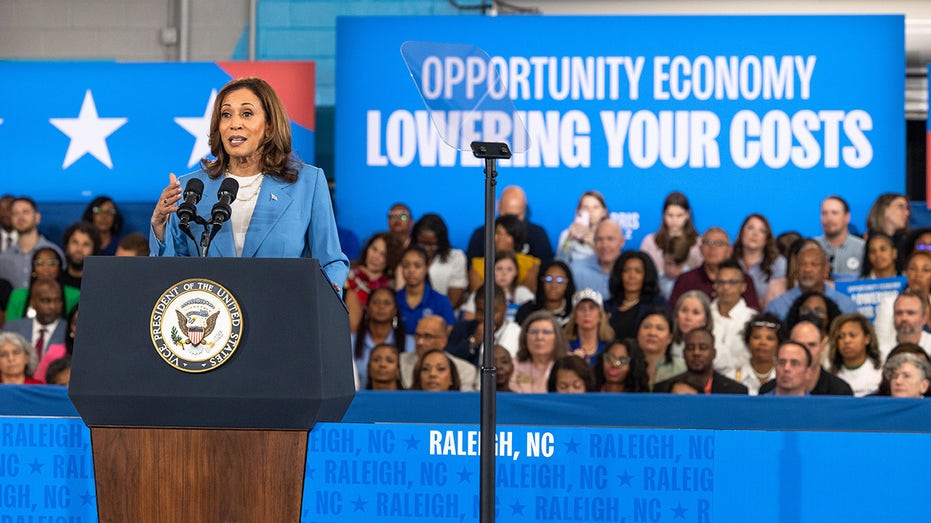Conservative economists are pouring cold water on Vice President Kamala Harris‘ new proposal aimed at reducing startup costs for new small businesses as part of her “Opportunity Economy” economic platform.
Harris unveiled new small-business tax proposals last week aimed at reducing the cost burden related to starting a new business. Among the proposals was a substantial increase in the standard tax deduction for small-business startup costs, from $5,000 to $50,000. “It’s essentially a tax cut for starting a small business,” the vice president said during a stump speech announcing the new proposal. “We’re going to help more small businesses and innovators get off the ground.”
Meanwhile, Harris has simultaneously expressed support for raising marginal tax rates for both corporations and individuals, which conservative economists argued would work to diminish the benefit received by the tenfold increase in the startup deduction.
“She wants to increase taxes on all kinds of income, on all classifications of income, so no matter how the small business is ultimately structured, they will still be paying more,” conservative economist E.J. Antoni told Fox News Digital. “Now, is that going to be diminished by this increase in the tax deduction? Absolutely. But, then, why are you doing both? That doesn’t make any sense.”
NEW YORK REPUBLICAN WRANGLES WITH CNN HOST HITTING TRUMP’S ECONOMIC POLICIES
Under the Trump administration, standard deductions were increased while marginal tax rates were lowered, Antoni pointed out. Additionally, under former President Trump’s tax cut measures, small business owners were allowed to claim a deduction for their “qualified business income.” It will ultimately be up to Congress to decide whether to keep any of Trump’s expiring tax cuts.
Trump spoke at the Economic Club of New York on Thursday, during which he laid out plans like lowering the corporate tax rate from its current 21% to 15%. Trump’s first-term tax cuts reduced it previously from 35%.
“Harris wants to do the opposite [of Trump],” Antoni said. “She wants to increase the deduction, but then increase the marginal tax rates.”
PENNSYLVANIANS SOUND OFF ON WHERE THEY BELIEVE HARRIS STANDS ON KEY ISSUES
Robert Wolfe, a Harris supporter and former chairman of UBS Americas, a global wealth management firm, pointed out that the tax rate increase for individuals will only impact those making more than $400,000.
“We want small businesses being built,” Wolfe said. “And we know that the ramp-up phase takes time, and so the idea that we wouldn’t applaud small businesses and entrepreneurs getting tax credits doesn’t make sense to me.”
Richard Stern, director of the Grover M. Hermann Center for the Federal Budget at The Heritage Foundation, said that under current tax laws, new business owners can already deduct most early-stage expenses, like payroll and equipment costs. Startup expenses, meanwhile, are defined under the tax code as those costs incurred prior to a business being registered with the federal government, which, according to Stern, are typically pretty minimal.
“Harris’ new tax deduction for small businesses isn’t a subsidy for starting a business per se,” he said. “It’s only useful if you actually spend $50K on pre-business expenses. So, this is disproportionately a subsidy for larger starting businesses.”
Stern also agreed with Antoni’s take that Harris is essentially giving to small businesses with one hand, while taking from them with the other.
Antoni, meanwhile, suggested that whoever is formulating economic policy for the Harris campaign is “building the train as it goes down the tracks.”
“It really seems like there were no policy proposals thought out ahead of time, and they are just throwing these things together,” he said.
While right-wing economic experts argue Harris’ latest tax proposal would be diminished by her plans to raise taxes in other areas and do little to help inexperienced business owners start their first company, Roger Hochschild, a Harris supporter and former CEO at Discover Financial Services, says the move will be “critical to driving further economic growth.”
“I think she is very clear in her support of small businesses and acknowledging that they are the backbone of the economy,” Hochschild said.
Rhett Buttle, a former 2020 Biden campaign adviser, echoed that sentiment. He said the increased tax deduction proves Harris’ “deep commitment” to entrepreneurs, according to NBC News.
“There are broad strokes here to people from all walks of life,” he said. “Small business and entrepreneurship tends to be a great unifier in a world where people have starkly different political divisions,” Buttle said.
In addition to Harris’ new tax proposals for small businesses, she also laid out her plan this week for taxing capital gains. She wants to increase it to 33%, whereas Biden reportedly wants the current rate, which is at 23.8%, to be nearly doubled, according to The Wall Street Journal.
Fox News Digital reached out to the Harris campaign for comment on the criticisms about her small-business tax proposal, but was only directed to a social media post of a small business owner speaking at a Harris campaign rally.
“Do you think that your small business is better off now, than it was under the Trump administration?” NBC’s Gabe Gutierrez asked the entrepreneur.
“Oh, without a doubt,” the business owner, Brad Smith, responded. “And I think the reason is everything to do with optimism — if you’re a doom-and-gloom candidate, or president, you are not going to start a business.”
























